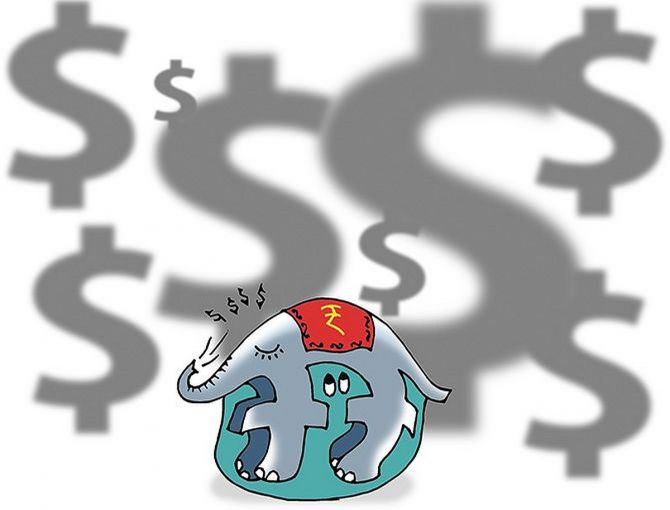'With China falling out of favour, India is where investors see the demographic and digital dividend apart from the benefits of reforms playing out.'
'Your prime minister has also done a great job of sharing this story with the world.'

Global investors recognise the reforms brought about by emerging economies, including India, and as and when the US Federal Reserve eases interest rates, they will start looking at emerging markets more constructively, says Manraj S Sekhon, chief investment officer, Templeton Global Investments.
In an in-person interview with Abhishek Kumar/Business Standard in Mumbai, Sekhon says India's low-correlation with other key markets makes it an ideal bet for diversification.
The most pertinent question is whether the US will make a soft landing this year. In case it fails to do so, how do you expect the global markets to react?
Yes, we do expect a soft landing this year. The US economy was surprisingly resilient last year despite aggressive rate hikes.
Corporate balance sheets are in good shape and jobs growth continues to be strong.
One area we will be looking at closely is the small and mid-sized companies to see if there is a slowdown.
These companies, which provide the bulk of the jobs, are facing higher costs owing to rate hikes.
Overall, we are constructive on the US market. If there is a sharp slowdown, the Fed has said it will ease monetary policy. This will provide a cushion for the global markets.
How does it bode for the emerging markets?
We are positive for emerging markets this year, primarily due to the easing of interest rates in the US.
This will drive investors' interest and appetite. As a result, the pressure on currency will also ease.
In the last couple of years, most emerging markets have done extremely well, both in terms of economic and market performance, despite the tightening in interest rates.
This is a result of the major reforms during the pre-covid period, from taxation to monetary and bankruptcy.
The market has recognised the reforms and the stability in currencies. As and when the Fed eases the interest rates, investors will look at emerging markets more constructively.

IMAGE: Manraj S Sekhon.
Photograph: Kind courtesy Manraj S Sekhon/Linkedin
Can China turn the corner this year? Do current valuations factor in most negatives?
We remain cautious of China. The economic model has transitioned to be less open and more regulated.
The new leadership, which is trying to clean up the economy, has created a lot of uncertainty, while also slowing down the decision-making.
For investors, the visibility has gone down and hence the risk premium has gone up. This is why you are seeing low valuations.
Analysts in India do not see scope for a significant upside this year. What explains the growing interest of global investors?
There is a perfect storm in India. We can debate on valuations, but global investors' attraction towards India is unlike ever before.
The reforms, across taxation, digitisation, banking and bankruptcy is a known story.
What is new is that because of challenges elsewhere, you are beginning to see FDI flows coming into India, which was always lacking in the past.
The production-linked incentive scheme and the China-plus-one strategy is leading to corporates relocating capacity to India.
Though the numbers are low, the trend and trajectory is positive.
With China falling out of favour, India is where investors see the demographic and digital dividend apart from the benefits of reforms playing out.
Your prime minister has also done a great job of sharing this story with the world.
India has distinct structural and secular drivers in place and hence low correlation with the other major economies.
Considering these factors, foreign investors are willing to pay a premium. This will continue.
For portfolio managers, the only worry is that any negative surprise can bring about a sharp recalibration. That also will probably be short-lived.
Do you see any emerging headwinds?
We have been looking out for difficulties in earnings for some time, but the probability has now gone down.
If you look at the growth and inflation forecasts for the US, they have been coming down and going back up.
The economy, as Western investors like to describe it, is in goldilocks right now. Not too hot, nor too cold.
In case the US sees a slowdown, the Fed has the room to ease policy. Geo-political risks are always present, just the sources change.
Apart from India, where do you see opportunities among emerging markets?
We see opportunities in Brazil as valuations are cheap.
West Asia is of growing interest but the bottom-up opportunities are still scarce in the global context.
The interesting thing in West Asia is the spillover.
The demand for infrastructure is driving other stories elsewhere.
The other area we are excited about is the new economy in north Asia, where themes like electrification of vehicles and green energy are playing out.
There are some attractive companies in China, Taiwan and South Korea.
Can oil prices play a spoilsport?
I don't see a high possibility of a spike in oil prices.
There is a huge fiscal push in West Asia, led by Saudi Arabia to drive the growth agenda and hence it is important for them that the oil prices are well managed.
Given the uncertainties in the world with respect to Russia-Ukraine and China, I don't think the OPEC producers will want to be seen as unhelpful to the stability of oil prices and subsequently to inflation and growth.
Leaving aside the West, the growth of the rest of the world is mutually dependent.
In the absence of another geo-political event, oil prices should not see high volatility.
Feature Presentation: Rajesh Alva/Rediff.com











